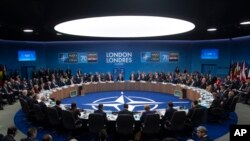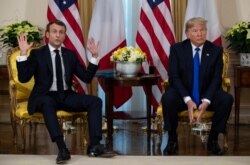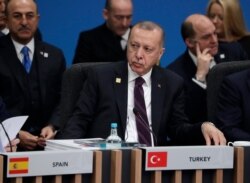For Londoners, the summit marking the 70th anniversary of NATO was nothing to cheer about, adding as it did to the misery of the daily commute with road closures in the center of Britain’s gridlocked capital. Misery was further compounded by rail workers deciding to call a strike.
Londoners’ surliness was in keeping with the mood of the unfolding summit itself — this has not been a joyous anniversary celebration but one mired in dispute and gridlocked by competing visions, say analysts.
The leaders of the 29 member states have managed confected words and offered flashes of official bonhomie, but right from the get-go of the two-day gathering divisions were exposed — and that was ahead of the formal grand session.
U.S. President Donald Trump rebuked French President Emmanuel Macron for his pre-summit description of NATO as “brain dead” and for casting doubt about Washington’s commitment to Euro-transatlantic security. “Insulting” was Trump’s take. “You just can’t go around making statements like that about NATO. It’s very disrespectful,” Trump said.
Macron later in a prolonged press conference with the U.S. leader doubled down on his criticism of NATO. “I know that my statements created some reaction, shaking a little bit a lot of people, I do stand by them.” The American and French leaders appear to have engaged in a role reversal since the last NATO summit, to the bewilderment of many commentators.
Last year, it was Trump who was upbraiding the Europeans for spending too little on the alliance’s running costs and casting doubt on the purpose of NATO. In London he appeared as the defender of NATO against a disruptive French President.
But Trump appears now to have no doubt that the organization “serves a great purpose,” a presidential announcement which came as some relief to European defense officials, who feared Washington has been cooling to the alliance, a worry that’s given Macron an opening to advocate for a breakaway European defense alliance, separate but parallel to NATO.
The first day of clashes was symptomatic, observers say of an existential crisis for NATO.
The West’s leaders are not any closer to resolving serious disputes over the future of NATO and as the summit unfolded made little advance in restoring a modicum of political cohesion to underpin the 70-year-old organization, often described as the greatest military pact the world has ever known. “At 70, NATO remains intact. But for how much longer?” Britain’s Daily Telegraph asked Tuesday, which noted in an editorial German Chancellor Angela Merkel’s frustrations with Macron’s grand French-led defense vision.
President Trump is likely to press harder in the coming months for the Europeans to share much more of the burden and costs of NATO. And after the summit has concluded, Macron is likely to continue with his advocacy of a root-and-branch change and for the West to decide who is the enemy — Russia, China or Islamist terrorism. Later Tuesday NATO leaders are likely to agree to side-step a decision on organization’s future goals by deciding to set up a commission to study the issue and to make recommendations.
For some the of the leaders gathered in London the more immediate and pressing problem has been what to do about Turkish President Recep Tayyip Erdogan, who wants to continue to pursue his loose alliance with Vladimir Putin’s Russia and Iran, as well as to flout in the process, as far as the Europeans see it, the democratic principles NATO is meant to protect.
Erdogan, despite his decision to buy Russia’s S-400 air defense system, still is demanding the West join his campaign against Syria’s Kurds, who teamed up with the U.S., Britain and France to defeat the Islamic State terror group. Michael Clarke, the former director-general of the Royal United Services Institute, a London-based think tank, has dubbed Erdogan’s agenda as “frankly eccentric.”
Turkey aside, other NATO fault-lines are emerging between southern Europeans, who see North Africa and the Middle East as threats organization should focus on because of terrorism and migration, and the Central Europeans and the Baltic states, who insist the real menace remains with an assertive Russia.
“NATO has struggled to maintain the basic political consensus that backs up any use of military force, despite — or perhaps because — it has doubled its membership since 1995 to embrace the new democracies of Europe,” said Clarke.






